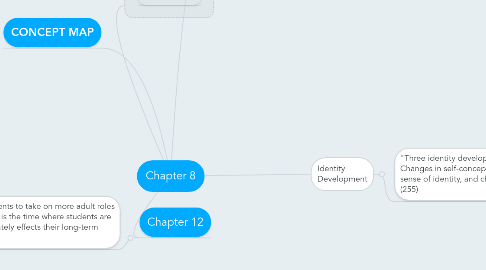
1. Chapter 12
1.1. Adolescence is a time for students to take on more adult roles and learn at higher levels. This is the time where students are influenced the most and ultimately effects their long-term occupational development.
1.1.1. Puberty has a large effect on the students achievement in school. When a child is going through puberty they are very emotional and at times those emotions can distract them from achieving their goals.
1.1.1.1. Although achievement is examined through many factors it is mostly influenced by parents. Both of my parents worked in education, so therefore they were big encouragers all throughout my educational experience. I like to think they are a big reason I am so driven towards becoming a teacher.
1.1.1.1.1. The fear of failing is another factor that inhibits students from achieving success. I think fear of failing is something everyone is afraid of. However, some of the most creative and famous people in the world got to the top by failing hundreds of times.
2. Chapter 9
3. CONCEPT MAP
4. "Autonomy is a psychosocial concern that surfaces during the entire life cycle." (287)
4.1. Emotional autonomy is the freezing of being independent. For example, many teens feel a need to have independence from their parents. Getting their drivers license is an example of an emotional autonomy.
4.1.1. "Cognitive automony concerns the development of independent values." (288) Ex: Getting your drivers license.
4.1.1.1. Adolescents typically want to break free from their parents and detach from their rules and regulation. They begin to question their authority figures and start to try and find ways to stratify their individual needs. It is the parents job to keep a family dyadic that encourages growth and development of their individuality.
4.1.1.1.1. As the teen grows older they will become more and more exposed to peer-pressure.Typically "parents who are the most authoritarian or extremely permissive are the most effected by the influence of their friends." The reason they are more effected is because the over the top intense family strutter causes the child to rebel. Even the parent who is permissive still causes the child to not understand what is right and wrong and how to make sensible decisions for themselves. A parent should be strict with their child but no so strict that they feel the need to rebel.
5. Identity Development
5.1. "Three identity developments in adolescence: Changes in self-conceptions, changes in the sense of identity, and changes in self-esteem." (255)
5.1.1. Puberty is the key time for identity development. By going under physical changes the individuals self-image fluctuates.
5.1.1.1. "Big Five Basic Personality Dimensions: extraversion, agreeableness, conscientiousness, neuroticism, and openness to experience." (258)
5.1.1.1.1. High self-esteem is directly correlated with parental and peer approval. It is also associated with better mental health.
